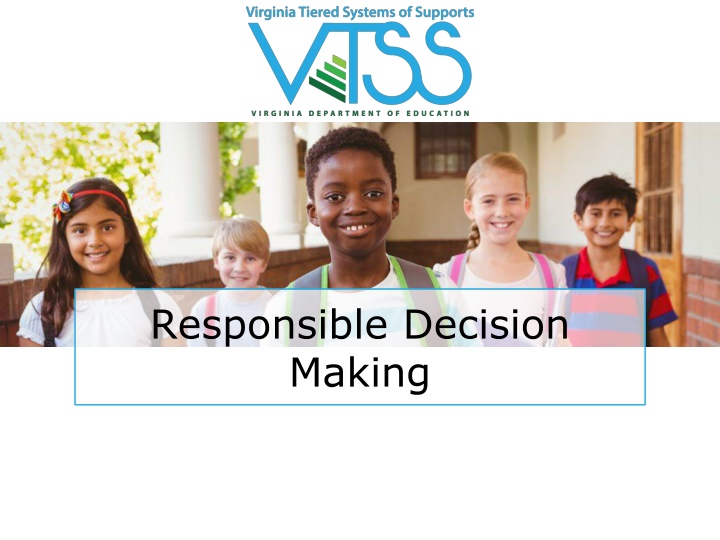
Responsible Decision Making and Strategies for Classroom Support
Explore the importance of responsible decision-making, learn strategies for fostering these skills in students, and discover ways to promote ethical standards and safety concerns in social interactions. Gain insights on problem identification, problem-solving, evaluation, and reflection to enhance personal, moral, and ethical responsibility.
Download Presentation

Please find below an Image/Link to download the presentation.
The content on the website is provided AS IS for your information and personal use only. It may not be sold, licensed, or shared on other websites without obtaining consent from the author. If you encounter any issues during the download, it is possible that the publisher has removed the file from their server.
You are allowed to download the files provided on this website for personal or commercial use, subject to the condition that they are used lawfully. All files are the property of their respective owners.
The content on the website is provided AS IS for your information and personal use only. It may not be sold, licensed, or shared on other websites without obtaining consent from the author.
E N D
Presentation Transcript
Responsible Decision Making
What We Will Know and Do Build an understanding of the importance of responsible decision making. Leave with some strategies or techniques that you could try in the classroom to support your students in developing responsible decision making skills
Responsible Decision Making Responsible decision-making is the ability to make constructive choices about personal behavior and social interactions based on ethical standards, safety concerns, and social norms.
Decision Making Skills Skills include: Problem identification and situation analysis Problem solving Evaluation and reflection Personal, moral, and ethical responsibility
What Does it Look Like? Responsible Decision Making Children can make responsible decisions by developing the ability to analyze a situation, understand its ethical implications, and evaluate the consequences. Parents and educators can help students learn to think through all parts of a problem and encourage them to make decisions on their own. Produced in partnership with CASEL and the Montgomery County Educational Service Center.
Strategies to Promote Responsible Decision Making Skills
Responsible Decision Making Strategies Responsible Decision Making strategies involve: Articulating differences and connections Identifying emotions behind actions Brainstorming different approaches or solutions to a task Exploring possible consequences Modeling and articulating decision making process Reflecting on past experiences Evaluating actions Role playing a task
Elementary Activity - Stop, Think, Act
Middle School Role Playing Activity
Dont Be Stuck On the Escalator What does this look like?
Discussion We problem solve around academics dailey, how can we continue to support our students using decision making skills socially?
Practice Instructions: Identify one of the strategies we have discussed (or one of your own ideas) that you would like to try. Pick something that will take relatively little effort to implement. Think about particular students you would like to use the strategy with Why did you pick the strategy you did? How would you put it in place or get started? How would you practice it? Or how would your students practice it? What will your immediate next steps be?
Team Talk: Review the How How will you adjust your practices to support learning for students who have experienced trauma? How will you involve families and students in practices? Fill this in on your Action Plan under Objectives and Action Planning
References/Resources https://casel.org/core-competencies/ http://actforyouth.net/youth_development/pro fessionals/sel/decision_making.cfm https://youtu.be/yWSSPnTB6OY https://education.mn.gov/mdeprod/groups/co mmunications/documents/hiddencontent/bwrl/ mdcz/~edisp/mde073493.pdf https://youtu.be/47rQkTPWW2I
